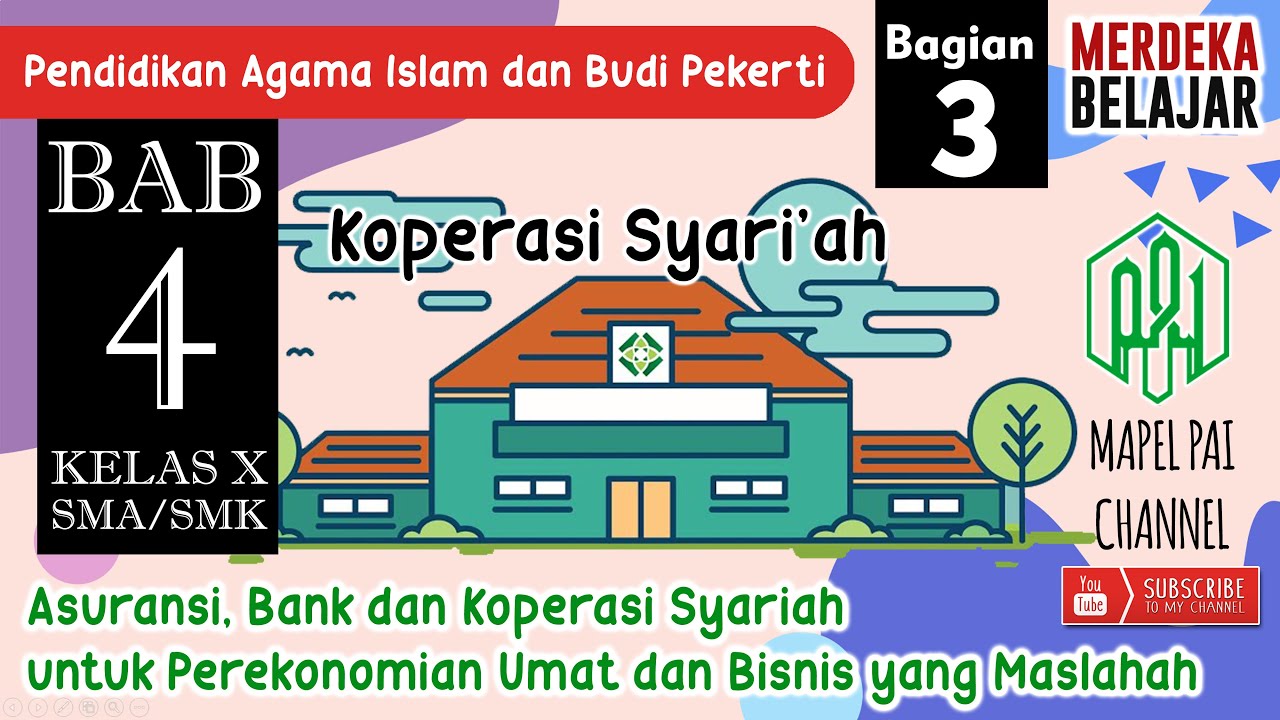PERBEDAAN KOPERASI SYARIAH DAN KONVENSIONAL, penjelasan jelas dan ringkas
Summary
TLDRIn this video, Aquatin Kamilah, a student from UIN Sunan Ampel Surabaya, provides a comprehensive explanation of the differences between Shariah cooperatives (Koperasi Syariah) and conventional cooperatives (Koperasi Konvensional). The video outlines key distinctions in terms of principles, systems, oversight, product distribution, and zakat. While conventional cooperatives operate based on Pancasila and offer interest-based lending, Shariah cooperatives adhere to Islamic principles, using profit-sharing instead of interest and promoting zakat. This informative video helps viewers understand the fundamental differences and roles of each cooperative type in the economy.
Takeaways
- 😀 Cooperatives are organizations that help members achieve common goals through collective efforts.
- 😀 There are four types of cooperatives: producer, consumer, savings and credit, and service cooperatives.
- 😀 Shariah cooperatives (koperasi syariah) are governed by both Islamic principles and general national principles like Pancasila.
- 😀 Conventional cooperatives (koperasi konvensional) follow national principles such as Pancasila and the 1945 Constitution.
- 😀 Shariah cooperatives avoid interest (riba) and use a profit-sharing system (bagi hasil) instead.
- 😀 Conventional cooperatives often involve interest-based loans, leading to potential conflicts with Islamic finance principles.
- 😀 Shariah cooperatives have a dual oversight system, including both performance and Shariah compliance monitoring.
- 😀 Conventional cooperatives only focus on performance oversight, lacking a specific focus on religious compliance.
- 😀 Shariah cooperatives sell goods outright (murabahah) rather than offering credit with interest.
- 😀 Conventional cooperatives typically offer loans with interest, allowing repayment over time with added interest.
- 😀 Shariah cooperatives emphasize zakat, encouraging their members to contribute to charitable causes in accordance with Islamic teachings.
- 😀 Conventional cooperatives do not have a formal role in collecting or distributing zakat.
Q & A
What is the primary function of a cooperative?
-A cooperative is an economic organization or business operated by its members to fulfill their collective needs and interests, focusing on mutual benefits.
How are cooperatives classified?
-Cooperatives are classified into four main types: producer cooperatives, consumer cooperatives, credit cooperatives (savings and loans), and service cooperatives.
What are the core differences between Shariah and conventional cooperatives?
-The core differences lie in principles, systems, supervision, product distribution, and zakat function. Shariah cooperatives incorporate Islamic principles and avoid interest-based systems, while conventional cooperatives follow secular economic principles and may use interest in their transactions.
What principle do conventional cooperatives follow?
-Conventional cooperatives follow the principles of Pancasila, the Indonesian Constitution, and the concept of mutual benefit among members.
What principles guide Shariah cooperatives?
-Shariah cooperatives are guided by Islamic principles, specifically the teachings of the Quran and Sunnah, ensuring all activities comply with Islamic law.
How do conventional cooperatives generate profits?
-Conventional cooperatives generate profits through an interest-based system, charging members interest (riba) on loans and financial products.
How do Shariah cooperatives distribute profits?
-Shariah cooperatives distribute profits through a profit-sharing system, avoiding interest (riba) and instead using fair, agreed-upon methods of sharing income.
What type of supervision do Shariah cooperatives have?
-Shariah cooperatives are subject to two types of supervision: performance oversight to monitor operational efficiency, and Shariah compliance oversight to ensure all activities align with Islamic law and ethics.
What is the main difference in product distribution between conventional and Shariah cooperatives?
-In conventional cooperatives, products and loans are typically offered with interest, while Shariah cooperatives sell goods through a direct transaction called 'Murabahah' (cost-plus pricing), without interest.
How do Shariah cooperatives handle zakat?
-Shariah cooperatives actively encourage and facilitate the payment of zakat (Islamic charity), playing a role in distributing it to the rightful recipients, whereas conventional cooperatives do not deal with zakat.
Why is profit-sharing used in Shariah cooperatives instead of interest?
-Profit-sharing is used in Shariah cooperatives because charging interest (riba) is prohibited in Islam. Instead, the cooperative and its members share profits based on agreed terms that are fair and compliant with Islamic principles.
What is the significance of Murabahah in Shariah cooperatives?
-Murabahah is a transaction model used in Shariah cooperatives where goods are sold with a markup instead of providing loans with interest. This model ensures transparency and aligns with Islamic finance principles.
Outlines

Cette section est réservée aux utilisateurs payants. Améliorez votre compte pour accéder à cette section.
Améliorer maintenantMindmap

Cette section est réservée aux utilisateurs payants. Améliorez votre compte pour accéder à cette section.
Améliorer maintenantKeywords

Cette section est réservée aux utilisateurs payants. Améliorez votre compte pour accéder à cette section.
Améliorer maintenantHighlights

Cette section est réservée aux utilisateurs payants. Améliorez votre compte pour accéder à cette section.
Améliorer maintenantTranscripts

Cette section est réservée aux utilisateurs payants. Améliorez votre compte pour accéder à cette section.
Améliorer maintenantVoir Plus de Vidéos Connexes

Nilai dan Prinsip Koperasi Syariah vs Koperasi Konvensional

Bab 4 Asuransi, Bank, dan Koperasi Syariah | Bagian Ketiga Koperasi Syari'ah | Kurikulum Merdeka

Sejarah Koperasi di Indonesia | UBGBS info!

KOPERASI

Lembaga Keuangan Bukan Bank-Materi Ekonomi Kelas X IPS & X MIPA LM

Patra Rusdianto, S.E || Organisasi dan Badan Usaha Kopma
5.0 / 5 (0 votes)
